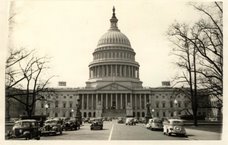Not so long ago it was enough that our civic mindedness and political awareness were adequately framed around affairs of our own neighborhoods and our nation. But that was then; this is now.
Now (2005) we are consumed with elections in far away places. We have constructed a pseudo reality and broadcast the logical contention that elections outside our borders are tantamount in importance to our own. Are they? Do the good people of New Hampshire, Minnesota, Kansas, and Washington believe that their sons' and daughters' sacrifices to deliver an Iraqi election on January 30 was worth it, no matter the cost?
How much should we pay for a single vote abroad? How many U.S. lives should be laid down to defend the voting opportunity of a single voter in Iraq? I am plagued by these questions because they are mired in the guts of the Push for meeting January 30th elections. The insistence that there is no possibility of postponement is ludicrous. (Perhaps those in the Beltway who shout the loudest for Jan. 30th should be required to send their first-born to Mosul. 'Walk the talk,' say I.]
Sports metaphors continue to appear in this war by news commentators who compared the Fallujah campaign to a memorable years-ago Packer's offense. Sports are ruled largely by those who dictate that games must be played or forfeited; rarely are exceptions made. So you see the dangerous conditions continue in rain, ice, snow, and mud in which men endanger their lives and their families' welfare by performing as gladiators did centuries ago because the 'rules' dictate.
There is no logic to it. Those who place human life at a higher priority than any sports event would gladly say, "It's unsafe; reschedule it, period." The machismo of war and military engagement tend to implode eventually. "Bring it on!" you say? Finally, even a Commander-in-Chief understands that his words were damaging and he has come to regret the power of his own 'loose' language.
As the enemy insurgents pluck off the mayors, the governors, the voters, the security guards, and it goes without saying, our U.S. and coalition troops, we are still hurdling pell-mell towards January 30 as though that is the end goal, the prize. But is the 'prize' merely, in some minds, the demonstration that elections are held on that day? Touchdown!
Back in December, interim Iraqi Prime Minister Allawi suggested that the elections could be spread over a period of several days or weeks improving the likelihood that more Iraqis could vote safely. Joining him in spirit from another microphone elsewhere was Russia's president Vladmir Putin. Even one of the U.S. closest allies, Canada, held an international forum on preparing for the Iraqi election and how to observe its safeguards and rightful principles. Take note: the emergence of Canada in the world's perusal of the sanctity of the election has all the potential of raising hackles between an already-fractured friendship with Canada. Just imagine the possible scenario of U.S. displeasure with Canadian election monitors' disapproval with election proceedings. The risks are great, eh?, when your closest allies also stand close to being disenfranchised over a Tactic towards birthing a republic in the blood-soaked 'Garden of Eden.' Let's call it what it is: the DATE of an election is not the Outcome nor the Results 10-20 years later. It is a 24-hour encapsulated time period arbitrarily selected. January 30th was and is a Tactic of the migration from war (which is far from ending) to 'non-dictatorship' [for lack of certainty, since we can't forecast what Iraq's government will be] while fully occupied by foreign troops. This is hardly conducive to a 'free' election by anybody's definition.
And as the problems associated with elections in Iraq multiply exponentially, the worldwide challenges of counting Iraqi-expatriate vote grows similarly. Right here in the old U.S.A., the bastion of voting pride, honor, and responsibility we have had our own recent history scratching our heads over how to count 'every vote,' now haven't we? So it should hardly come as a surprise that in the U.S., the FIVE voting centers (only New Carrollton, Maryland; Chicago; Detroit; Los Angeles; and Nashville) create hardships for Iraqi expatriates in, say, Dallas, who want to vote, but can't get to their nearest voting place -- Nashville -- in time. Note: no absentee voting is allowed. Would we stand for this in the U.S.? Why do we impose rules that are untenable to us upon other countries and their foreign nationals living abroad here in the U.S. which are unfair and undemocratic, some say. In the time it has taken to finish the final sentences of this post, an AP news reporter filed a column that a suicide bomber's attack killed 3 Iraqi national election candidates. The days and hours are measurable standing between what we know and what lies beyond -- January 30. Whether we delay their election or whether we push onward, continuing to pay the hefty price for something-yet-to-be-defined a world away seems out of the control of the hands of mere mortals, certainly of mere voters in this country. We the people never bargained on the cost of a single vote in Iraq, did we?
skip to main |
skip to sidebar

The last word on the subject

You can run, but you can't hide

Until the Last Note

Scoundrels, Thieves & Infrequent Saints
"Save me from the lion's mouth: for thou hast heard me from the Horns of the Unicorns." (Psalm 22:21) Commentary, complaints, woes, and wonders about Life, the human condition, grubberment, 'popped' culture, and the Planet Girth.
Because I Said So

The last word on the subject
Out for Bear

You can run, but you can't hide
Muy Mysterioso

Until the Last Note
Here We Go Again

Scoundrels, Thieves & Infrequent Saints